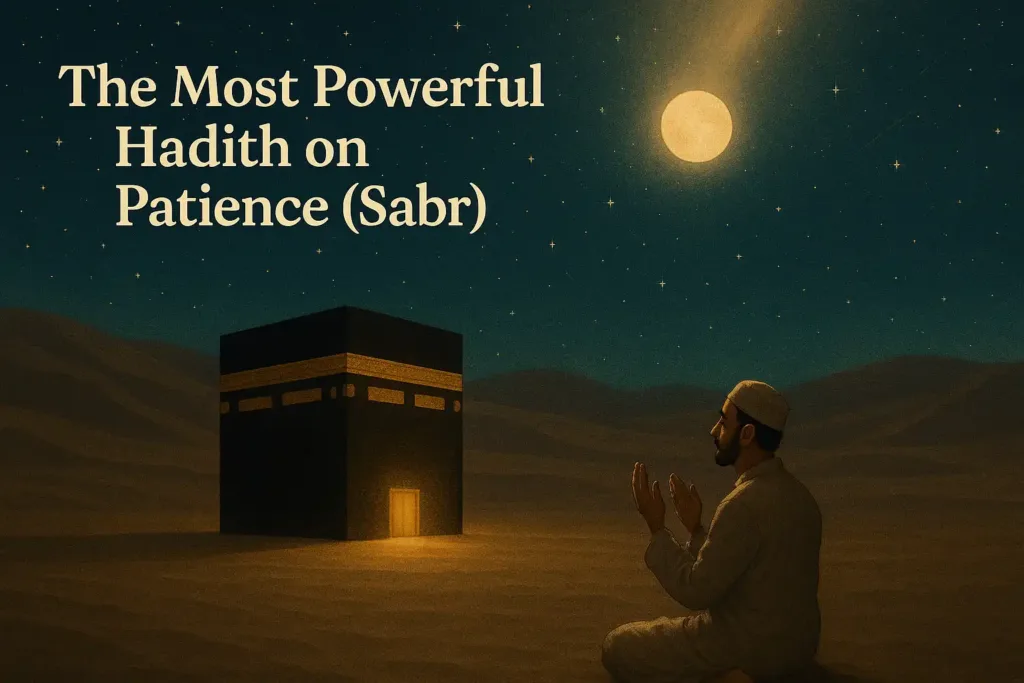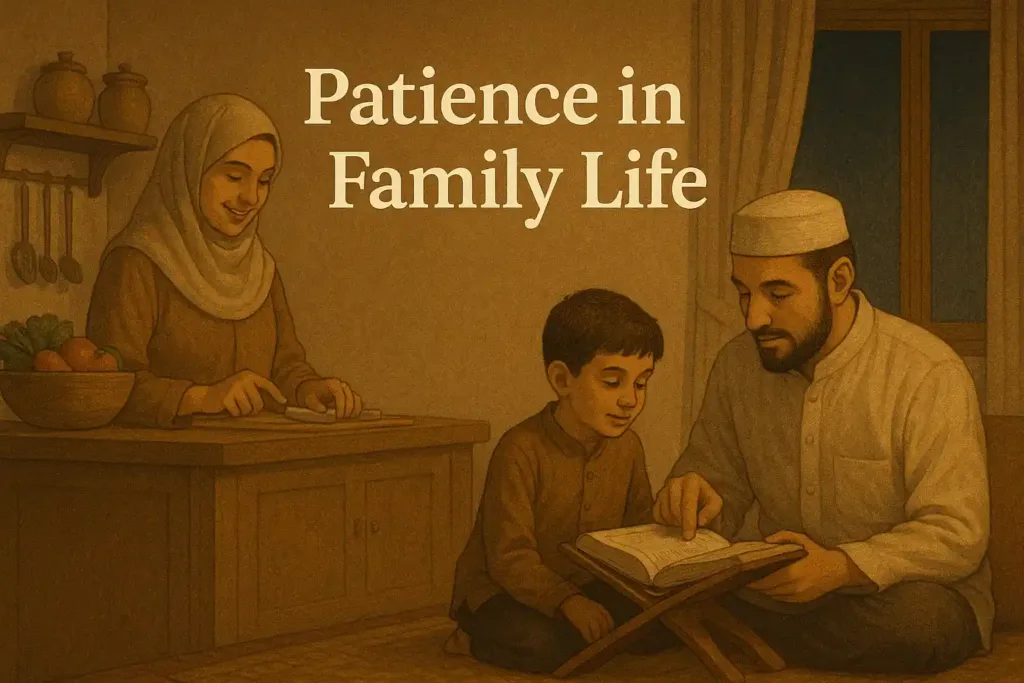Most Powerful Hadith on Patience

Every person has struggles in life. Sometimes the pain is so strong that it breaks the heart. A loved one whom we care for deeply leaves us, and the world feels empty. We work hard day and night, but success does not come. Sometimes sickness makes the body weak, and sometimes money problems make life heavy. In those moments, it feels like everything is closing around us, and the heart says, “I cannot take this anymore.”
We ask again and again, “Why is this happening to me?” And when we look at others, they look happy, smiling, and living in peace—while we feel full of sadness inside.
But Islam gives us a light in this darkness. That light is called Sabr (patience). Patience does not mean only waiting. It means keeping the heart strong, trusting Allah’s plan, and believing that every test has a reason. It means knowing that after every night comes a new morning, and after every hardship comes ease.
The Prophet Muhammad ﷺ taught us many beautiful lessons about patience. Among them, there is one Hadith that is known as the most powerful Hadith on patience. It reminds us how to face pain in the very first moment of hardship and how to find strength in faith.
Also Read:
In this blog, we will read about what patience means in Islam, the most powerful Hadith on patience, the story behind it, and the lessons that can change our life.
What Patience (Sabr) Means in Islam
In Islam, Sabr (patience) means more than waiting. It means staying calm when life is hard, controlling anger when someone hurts us, and keeping faith when Allah tests us.
Allah mentions patience many times in the Quran. This shows how important it is for every believer.
- Allah says:
“Indeed, Allah is with the patient.” (Surah Al-Baqarah 2:153) - And also:
“And We will surely test you with something of fear and hunger and a loss of wealth and lives and fruits, but give good tidings to the patient.” (Surah Al-Baqarah 2:155)
These verses tell us that trials will come, but patience brings reward and Allah’s closeness.
The Most Powerful Hadith on Patience
Arabic Text
إِنَّمَا الصَّبْرُ عِنْدَ الصَّدْمَةِ الْأُولَى
English Transliteration
“Innamas-sabru ‘inda as-sadmatil-oola.”
Meaning in English
“True patience is at the first strike of calamity.”
(Source: Sahih al-Bukhari 1283, Sahih Muslim 926)
This Hadith is short but very deep. It tells us that the real test of patience is the very first reaction when hardship comes.
The Story Behind This Hadith
One day, a woman was crying at the grave of her loved one. Her heart was broken, and she could not control her grief. Prophet Muhammad ﷺ passed by and gently told her, “Fear Allah and be patient.”
But in her pain, she did not recognize him and replied, “Go away, you have not been touched by my disaster!” Later, when she was told that it was the Prophet ﷺ who had spoken to her, she felt embarrassed. She went to his house to apologize.
The Prophet ﷺ then said:
“Patience is only at the first strike of calamity.”
(Source: Sahih al-Bukhari, Book of Funerals, Hadith 1283; Sahih Muslim, Book of Funerals, Hadith 926)
This story shows that real patience is not about moving on after months or years. Real patience is shown right away—when the pain is fresh, and the heart is hurting the most. That is the moment when faith is tested.
Explanation of the Hadith
This Hadith teaches us:
- Anyone can say “I accept” after time has passed, but the strongest believer shows patience immediately.
- The first reaction to pain reveals our true trust in Allah.
- If we remember Allah in the first moment of loss, we will find peace.
For example:
- When losing a loved one, a believer says: “Inna Lillahi wa inna ilayhi raji’un” (Indeed, we belong to Allah, and to Him we return).
- When facing financial loss, the believer trusts that Allah will replace it with something better.
- When in sickness, the believer accepts that patience removes sins.
Lessons for Muslims Today
Here are practical ways to apply this Hadith in our lives:
- Patience in Prayer: Keep praying even if answers take time.
- Patience in Family Life: Stay calm in arguments, forgive mistakes.
- Patience at Work: Do your best, and leave the result to Allah.
- Patience in Health: Accept illness as a way Allah purifies sins.
- Patience with People: Control anger, respond with kindness.
Quran Verses That Support This Hadith
- “So be patient. Indeed, the promise of Allah is truth.” (Surah Ar-Rum 30:60)
- “And give good news to the patient – those who, when disaster strikes them, say, ‘Indeed we belong to Allah, and indeed to Him we will return.’” (Surah Al-Baqarah 2:155-156)
- “Indeed, the patient will be given their reward without account.” (Surah Az-Zumar 39:10)
These verses show that patience is not only an action but also a form of worship that brings endless reward.

FAQs on Patience in Islam
Q1: Why is patience important in Islam?
Because it shows trust in Allah’s plan and brings reward without limits.
Q2: Which Surah talks most about patience?
Surah Al-Baqarah and Surah Al-Asr speak strongly about patience.
Q3: How did Prophet Muhammad ﷺ show patience?
He showed patience in poverty, in loss of family members, and in facing insults. He always trusted Allah and never lost hope.
Conclusion
The Hadith “Patience is at the first strike of calamity” is a powerful reminder for every Muslim. It teaches us that the true moment of patience is not after time has passed, but in the very first second when pain enters our heart.
The story of the grieving woman and the words of the Prophet ﷺ show us that patience is faith in action. Life will always bring tests—loss, sickness, struggles—but for the one who shows patience, Allah promises reward, guidance, and peace.
Let us hold firmly to Sabr in prayer, family, work, and health. And when trials come, let this Hadith remind us to keep our hearts strong.
👉 Share this blog with friends and family to spread the message of patience in Islam.


